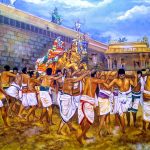Vikram swamy, thank you for this important question.
At the outset (i.e. when we look at translations) it appears this is true; but when we go to the specific slokas and look at it based on our acharyas’ teachings, it is clear that the passage says “Indira was very pleased that the demon was killed; he was standing in front of the Lord with his palms joined together; and he asked “please tell us what service we can do unto You now”.
Then Lord Rama gave him the service of bringing the vanaras back to life.
Details:
I checked this link where the entire Valmiki Ramayanam (slokas, word for word meaning, and translation) is given.
http://valmikiramayan.pcriot.com/utf8/yuddha/sarga120/yuddha_120_frame.htm
If we read the two sentence introduction in English, it says “When Indra the lord of celestials asks Rama for a boon, Rama requested Indra to bring back to life, all the monkeys who had lost their life in the battle.”
Now let us look at the verses and word for word meaning:
प्रतिप्रयाते काकुत्थ्से महेन्द्रः पाकशासनः |
अब्रवीत् परमप्रीतो राघवं प्राञ्जलिं स्थितम् || ६-१२०-१
1. kaakutthse pratiyaate = when Dasaratha returned; mahendraH = the Lord Indra; paaka shaasanaH = the destoryer of Paka; the demons; parama priitaH = was very much pleased; abraviit = and spoke; raaghavam = to Rama; sthitam = who stood; praaN^jalim = with joined palm.
When Dasaratha returned, the Lord Indra, the destroyer of Paka the demon, was very much pleased and spoke to Rama, who stood there with his joined palms.
Here the actual meaning should be ‘Indra stood with joined palms in front of Rama’. But western ideology based translators would prefer to do the opposite.
Let us look at the next sloka:
अमोघं दर्शनं राम तवास्माकं नरर्षभ |
प्रीतियुक्ताः स्म तेन त्वं ब्रूहि यन्मनसेप्सितम् || ६-१२०-२
2. raama = O Rama; nararShabha = the foremost among men!; asmaakam you; darshanam = sight of us; tava = to you; amogham = should not go in vain; sma = we are; priitiyuktaaH = endowed with delight; tena = therefore; tvam = you; bruuhii = tell; yat = whatevr; iipsitam = is desized; manasaa = by your mind.
“O Rama, the foremost among men! Your sight of us, should not go in vain. Therefore, tell us whatever is desired by you.”
Here again, the translator has fooled us. The word ‘tava’ means “of you’; not ‘to you’. (shasti vibhakthi = ஆறாம் வேற்றுமை உருபு; = genitive case ending) Therefore the correct translation should have been “O Rama, the greateast of all men, our darshanam of you must not go in vain. So, please tell us whatever is desired by you (and we are willing to do that service).
I request members who are knowledgeable in Samskrtam to verify and validate if what I have expressed is correct. Thank you.
adiyen dasan.

